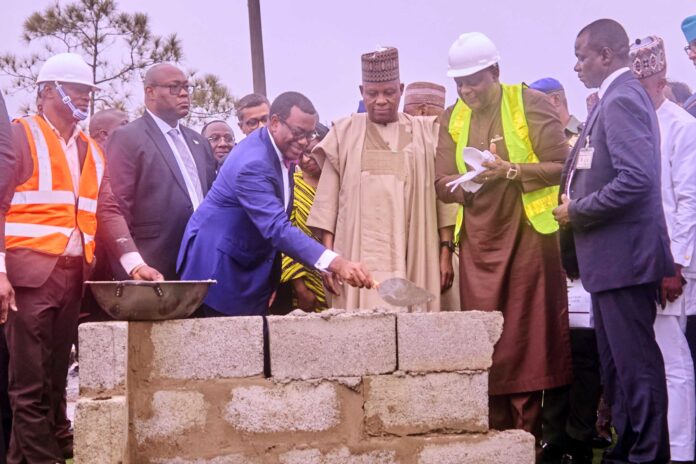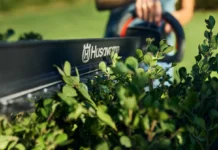
Nigeria’s Cross River State became the second to mark construction of a Special Agro-Industrial Processing Zone after the country’s Vice President Kashim Shettima and African Development Bank President Dr. Akinwumi Adesina broke ground at the project site on Thursday 10 April.
The SAPZ aims to tackle food insecurity, enhance local production, and position Nigeria as a food export leader by leveraging Cross River’s ports and research assets to boost global trade, reduce food imports, and drive prosperity through the agro-industrialization of crops like cocoa and cassava.
The groundbreaking in Cross River follows that of Kaduna (http://apo-opa.co/42Mquvu) which took place few days earlier. Six other states – Kano, Kwara, Imo, Ogun, Oyo, and the Federal Capital Territory – are included in Phase 1 of the $538 million SAPZ program, with plans to expand to the remaining 28 states this year pending the African Development Bank’s Executive Board approval for Phase 2 funding.
Shettima emphasized the project’s priority and need for national collaboration: “The SAPZ program has been recognized as a national priority for food security in Nigeria.” He noted, “There is no better time than now for the federal and state governments, development partners, the private sector, and our communities to work hand in hand to ensure the success of the SAPZ project.”
Adesina celebrated the milestone, saying, “Today is a big day for Nigeria,” and added, “The Special Agro-Industrial Processing Zones is bringing good news to Nigeria, State Governments and Local Governments. Good news to farmers, agribusinesses, and all rural areas of Nigeria. Good news of jobs, wealth, and prosperity with agriculture as a business.
“With the abundant arable land, cheap labor and vast agro-ecological areas, Nigeria should not be importing food,” said Adesina who was accompanied by his wife Grace Yemisi Adesina.
The Bank Group president highlighted Cross River’s export potential: “Bakasi deep seaport will turn the state into a logistics hub in Nigeria and the Gulf of Guinea, enabling trade with Cameroon, Equatorial Guinea, and Guinea Bissau.”
The 130-hectare Agro-Industrial Hub in Adiabo will leverage the Calabar Sea Port, Bakassi Deep Sea Port, a 23 kVA power plant in Tinapa, and a 630 kVA Calabar Power Plant. Its Agricultural Transformation Centre, supported by the Cocoa Research Institute of Nigeria and the University of Calabar, lies less than 45 minutes from Ikom, Etung, and Boki, boosting cocoa production for global markets.
Governor Bassey Otu outlined the state’s vision, saying, “For us in Cross River State, the establishment of clusters of smallholder farmers focused on staple and cash crops such as rice, cassava, millet, cocoa, and oil palm is a vital step toward agro-industrialization.”
“These initiatives are aimed at strengthening food security, diversifying our state’s economy toward export-oriented agriculture, and boosting our GDP,” added Governor Otu, saying the state should expect to see a big difference in two years.
The African Development Bank Group is investing $210 million, including $50 million from its Africa Growing Together Fund. The Islamic Development Bank is contributing $150 million, the International Fund for Agricultural Development is contributing $100 million, the Green Climate Fund is contributing $60 million, and the government is contributing $18 million.
Speaking during the occasion, the International Fund for Agricultural Development’s Country Director, Dede Ekoue, noted that the SAPZ will build on the Livelihood Improvement Family Enterprises in the Niger Delta (LIFE-ND) project which has empowered 26,000 youth and women agripreneurs in the Niger Delta, including 4,000 in Cross River, with plans to scale to 100,000 by 2028.
The Minister of Agriculture and Food Security, Abubakar Kyari, said, “The SAPZ program is a powerful catalyst for economic growth and import substitution. By investing in agro-processing development, we are investing in the future of our communities.”
The African Development Bank Group has committed $934 million to SAPZs in 11 African countries. The 2024 Africa Investment Forum (http://apo-opa.co/42eqx33), held in Morocco, recorded $2.2 billion in investor interest for 28 Nigerian states, which make up the second phase of the project.
Adesina explained that with the Special Agro-Industrial Processing Zones, Nigeria will reduce food imports, conserve foreign exchange, expand local production and processing of food and agricultural commodities, strengthen the Naira, and attract significant private investment into the development of agricultural value chains.
The Special Agro-Industrial Processing Zones will also revive and transform rural economies and create millions of jobs.
Adesina was accompanied by the African Development Bank Vice President for Agriculture, Human and Social Development Dr Beth Dunford, the Director General for Nigeria Dr Abdul Kamara, Prof Oyebanji Oyelaran-Oyeyinka, Senior Special Adviser on Industrialisation, Director Richard Ofori-Mante, Director of the Agricultural Finance and Rural Development Department, and Dr Yusuf Kabir, National Coordinator for SAPZ, Nigeria.
Distributed by APO Group on behalf of African Development Bank Group (AfDB).







